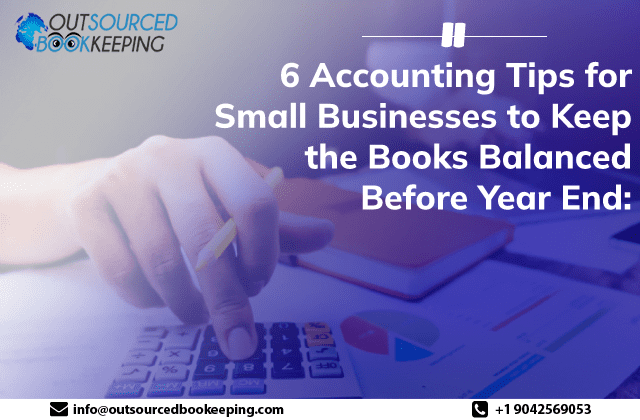If you are a small business owner then you are well aware of how busy year-end can be when it comes to having your books balanced. We understand you have to juggle multiple responsibilities and accounting is not exactly your top priority.

But if you have been through year-ends in the past then we know you need help. Especially budding entrepreneurs and small business owners need to have a checklist of good practices that can help them balance the books efficiently.
So in this blog here we have come up with 6 simple accounting tips that not only help your accounting activities for balancing your books in the year-end but also help you save a lot of time and money (avoid penalties) in the process. So read on:
1. Ensure record of all transactions: This step seems basic but the majority of businesses often overlook records of transactions in one way or the other and hasten-up things at the last minute. So make sure to record all your transactions till year-end and review all the necessary documents. It helps to use secure and automated tools that safely saves them all for future reference.
2. Do not overlook reconciliation: Reconciliation is how you ensure your books match up with bank and credit card records. Most businesses push the monthly reconciliation schedules due to a lack of ties or resources and unfortunately, this is where most mistakes and inaccuracies safely harbour. Cloud accounting software and tools can be of mighty help to accomplish this task.
But if you are using manual processes and if you are short of time to reconcile your bank and credit card records then you can quickly seek help from expert accounting firms that specialize in reconciliation services, like Outsourced Bookkeeping.
3. Pay attention to receivables & payables: If you are looking to finally balance our books at the year-end, then it’s high time to track and take action to collect your dues. Send reminders and reach out to customers regarding the payment and if they don’t seem to budge, offer new terms or a payment plan to make it easier. You can also approach collection agencies to help you sort out your receivables before year-end. Similarly, examine your payables with reports and settle dues and debts to clean the slate.
4. Evaluate your inventory: If you deal with inventory for your business, then evaluating them at the year-end may help you claim tax deductions in case their market value drops. This helps you check their current status, ensure they match with numbers reported, allows writing them off and account for expenses (depreciation) for your fixed assets.
5. Collect and organize your receipts: While we have already mentioned this point this needs reiteration since most small businesses overlook them. Collecting and organizing the receipts is the best way to avoid overpaying and claiming your tax deductions. So ensure you have all your receipts from customer invoices, business expenses to contributions for easy access.
Another key issue is the blending of personal and business expenses; so it helps to review your credit card statement and separate your finances to make it less ambiguous.
6. Start early with your books: This has to be the most non-accounting tip but also happens to be the most crucial one. It always pays to have to start the right foot when it comes to accounting and bookkeeping which is why we recommend all our clients at Outsourced Bookkeeping to start early.
All you need is to start preparing at the start of the year to accomplish this. Have your bookkeeper/accountant prepare a checklist that needs to be executed every month to keep your cruise along. This way you do not have to rush things at the year-end make mistakes and forego opportunities. However the majority of small and medium businesses do not have a dedicated bookkeeping and accounting department plan ahead and execute and if that is the case, you can simply outsource bookkeeping and accounting services to remote accounting firms like Outsourced Bookkeeping.
How Outsourced Bookkeeping can solve your year-end bookkeeping and accounting problems?
As one of the leading remote accounting firms in the business, Outsourced Bookkeeping is known for our seamless outsourced bookkeeping and accounting services. From Bookkeeping Services to Accounts Payable, Accounts Receivable, Bank reconciliation services and Quick Books Services, we provide a complete spectrum of bookkeeping and accounting services for all types of business.
But that is not just it, we also specialize in tax preparation, tax consultation services, year-end bookkeeping and accounting services for businesses that have limited time to balance their books. So if you are looking for quick help with your year-end bookkeeping and accounting processes, you can contact us here: https://outsourcedbookeeping.com/








